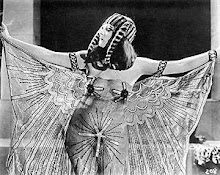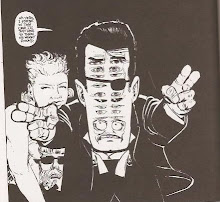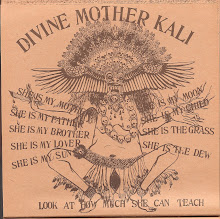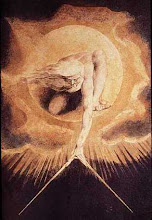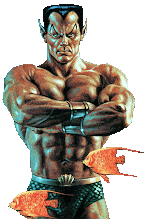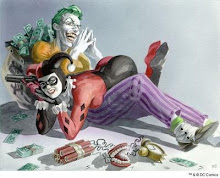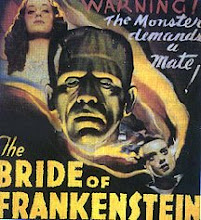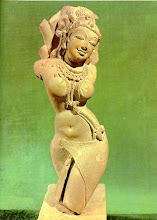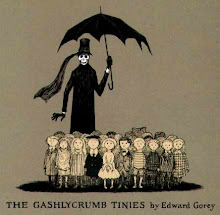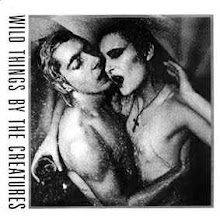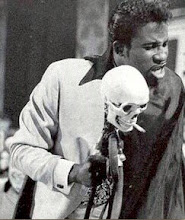
The best comic series that I've read recently was Eddie Campbell's
Bacchus. I was introduced to Eddie Campbell's work in
From Hell. Bacchus is based at the core upon Greek Mythology, Campbell updated the characters with one basic assumption: the gods aren't wholly immortal, they can die, they can age.
The action focuses on the aging god Dionysos going by his Roman name Bacchus. Bacchus has lost what the gods used as a fountain of youth. He has aged poorly because of his debauched life of booze and cigarettes. He looks like a weathered

old sea captain, wearing a captain's cap and pea coat. He survives on wine and spirits. He won't touch food or water. He also won't touch ale. He has lost an eye due to a corkscrew accident with the abbot Dom Perignon. He is a drifter, and the series begins and ends with him in a jail cell. He is no longer the fair haired youth of Euripides'
Bacchae. He is taunted and seems a weak, pathetic, old man. But as in
Bacchae he is a savage force to be reckoned with.

Simpson is his faithful servant. Simpson was a classical literature professor, who met Bacchus years ago as he was leading a group of students on a tour of Greece. Simpson, though physically weak, has a great deal of power as a lawyer to the loud ro

aring god. Simpson is also the undead. He was taken to Hades due to a clerical error, by Hermes. He managed to escape though and serves as the twice born's only surviving worshiper.
Hermes initially tried to take Simpson back to the land of the dead but eventually made amends with Simpson after the situation was explained by Bacchus.

Hermes is one of the few living gods left. He hasn't aged as poorly as Bacchus, but he is no longer the mercurial messenger of his youth.
It is still his duty to cart away the dead, though Hades himself is dead. Hermes is still strong and virile, but is showing the signs of age. His brow has become gray and he is no longer so swift.
A god who has retained the knowledge of the fountain of youth is Joe Theseus. Though he was only a hero long ago, he has since become a god. He is at odds with Bacchus, not because of his good looks

, but because he abandoned Ariadne after she helped him defeat the Minotaur. After leaving her on an island, the god Bacchus took her as his wife, but she eventually died. Joe Theseus is handsome and strong. He has a full head of hair, a beard, and is a financial whiz. He is the enemy of Bacchus. Joe Theseus has a wild card of an ally in the form of the Eyeball Kid.
The Eyeball Kid is one of the funniest characters from the whole series. He is the grandson of Argus Panoptes, the hundred eyed first son that Zeus had with a mortal. The Eyeball Kid has 9 partial pairs of eyes and the power to electrocute with his hands. He stole this power from Zeus and proceeded to kill all residents of Mount Olympus, before going on to kill the majority of the other gods.

There is no reasoning with the Eyeball Kid. Of all the insane characters in the
Bacchus universe, he has the least grip on reality. He has gone crazy on power. The power of his immortality and the power of the lightning that he has in his hands. Joe Theseus may only be aligned with him due to the fact that he

's afraid of what the Eyeball Kid is capable of.
I think that one of the reasons that I'm such a fan of
Bacchus is Eddie Campbell's sense of humor. Though the characters are Greek, the humor is most certainly Scottish. I remember watching Craig Ferguson on
Late Night with Conan O'Brien. This was in the years before he had his own show. His sense of humor was so irreverent. Sly but rowdy. His humor was a lot more rowdy on Conan's show. The humor in the world of
Bacchus is much the same. You have to pay attention to get the jokes, but when you get them, they are so outrageously funny. I have reread sections and discovered new jokes that would never get past the censors. They are subtle but edgy. Some of the jokes when he was in prison almost made me blush. Though the jokes in
Bacchus are profane, they are never obscene. That has a lot to do with the Scottish sense of humor. It is smooth and pleasant, yet coarse and worldly.
 Om SHAnti SHAnti SHAnti
Om SHAnti SHAnti SHAnti


























